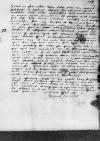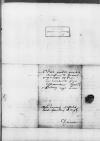Non dubito, quin iam acceperis Kohelet (Ecclesiastes) ⌊EcclesiastenKohelet (Ecclesiastes) ⌋ et psalmos aliquot, diu est enim quod eos tradiderim amico cuidam candidissimo, quem oravi tamen, ne temere cuivis committeret, non propter meas ineptias, sed ... illegible⌈...... illegible⌉ quod litteras binas incluseram ad dominum meum Johan Weze (*1490 – †1548), secretary to King Christian II of Denmark; in 1522 nominated Archbishop of Lund; in 1527 was banished from Denmark as Christian II's secretary, and joined the service of Emperor Charles V as his diplomat, 1537-1548 Bishop of Constance (WHALEY, p. 314)⌊archiepiscopum LundensemJohan Weze (*1490 – †1548), secretary to King Christian II of Denmark; in 1522 nominated Archbishop of Lund; in 1527 was banished from Denmark as Christian II's secretary, and joined the service of Emperor Charles V as his diplomat, 1537-1548 Bishop of Constance (WHALEY, p. 314)⌋ fidei meae commissas ab Heinemann Rode (Henemannus Rhodius Urbindagineus) (†1539)⌊H written over V⌈VHH written over V⌉enemanno RodioHeinemann Rode (Henemannus Rhodius Urbindagineus) (†1539)⌋. Vidi opus illud psalmorum nescio cuius Martin Bucer (Martin Butzer, Martinus Buccer) (*1491 – †1551), German Protestant theologian and Reformer⌊FeliniMartin Bucer (Martin Butzer, Martinus Buccer) (*1491 – †1551), German Protestant theologian and Reformer⌋, sed offendit me idem quod te ... illegible⌈...... illegible⌉, dictionis videlicet superinscribed⌈videlicetvidelicet superinscribed⌉ ipsius scabies et quo, quodque on the margin⌈quodquequodque on the margin⌉ saepissime non assequitur auctoris sententiam, maxime autem omnium, quod putem opus esse Martin Bucer (Martin Butzer, Martinus Buccer) (*1491 – †1551), German Protestant theologian and Reformer⌊Martini BuzeriMartin Bucer (Martin Butzer, Martinus Buccer) (*1491 – †1551), German Protestant theologian and Reformer⌋, hominis impie scelerati, quamvis de Christianismo suo neminem dubitare velit. Ob has causas lecto uno atque altero superinscribed⌈alteroaltero superinscribed⌉ psalmo totum opus abieci neque tamen dissuadeo quin legas. Non enim dubito, qualiscumque sit auctor ipse, quin multa habeat quae apud alios inventurus non sis. Admonitio tua adeo molesta non est, ut cupiam saepissime etiam acrius moneri superinscribed⌈monerimoneri superinscribed⌉ a te, quem non secus atque patrem ... illegible⌈...... illegible⌉ et amo et amaturus sum quoad vixero. Mittam spero brevi ad te quos tantopere cupis reliquos psalmos reliquos, absolvi enim fere centum, absoluturus alios superinscribed in place of crossed-out aliquos⌈aliquosaliosalios superinscribed in place of crossed-out aliquos⌉, studiis meis reliquis tua causa intermissis. Conradus Goclenius (Conradus Wackers, Conradus Gockelen) (*1489 – †1539), prominent humanist and editor; from 1519 professor of Latin at the Collegium Trilingue of the University in Louvain; friend of Erasmus of Rotterdam (DE VOCHT 1961, p. 76-77; CE, vol. 2, p. 109-111)⌊GocleniusConradus Goclenius (Conradus Wackers, Conradus Gockelen) (*1489 – †1539), prominent humanist and editor; from 1519 professor of Latin at the Collegium Trilingue of the University in Louvain; friend of Erasmus of Rotterdam (DE VOCHT 1961, p. 76-77; CE, vol. 2, p. 109-111)⌋ noster non solum paratus est, imaginem, quam habet Erasmus of Rotterdam (Gerrit Gerritszoon, Geert Geerts, Desiderius Erasmus Roterodamus) (*1466/1469 – †1536), Dutch humanist and theologian, distinguished philologist, the most famous and influential humanist of the Northern Renaissance; his works had a profound impact upon Christian theology during the first half of the sixteenth century⌊ErasmiErasmus of Rotterdam (Gerrit Gerritszoon, Geert Geerts, Desiderius Erasmus Roterodamus) (*1466/1469 – †1536), Dutch humanist and theologian, distinguished philologist, the most famous and influential humanist of the Northern Renaissance; his works had a profound impact upon Christian theology during the first half of the sixteenth century⌋, tuo rogatu ad pictorem Mechelen (Malines, Mechlinia), city in the Low Countries, 23 km S of Antwerp, today in Belgium⌊MecheliniamMechelen (Malines, Mechlinia), city in the Low Countries, 23 km S of Antwerp, today in Belgium⌋ mittere, sed et dono tibi dare superinscribed⌈daredare superinscribed⌉, si gratum fore putarit. Vale domine mi.


 AAWO, AB, D. 6, f. 142v
AAWO, AB, D. 6, f. 142v